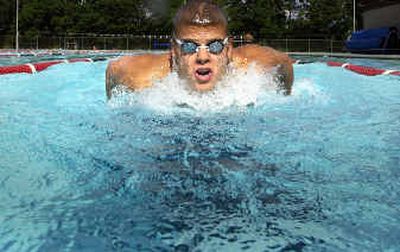Nuess, an 18-year-old from Medical Lake, will try to follow in footsteps of his mother, who, at 15, qualified for the 1968 Games

There’ll be a certain sense of nostalgia when C.J. Nuess rubs elbows with some of the world’s best swimmers next week at the United States Olympic Trials.
His mother, Diane Giebel-Nuess, will watch him compete for a national team berth in the same city, Long Beach, Calif., where she qualified for the 1968 Mexico City Olympics.
Nuess, 18, won’t be much older than his mother was 36 years ago when she learned after a long review that, at age 15, she had finished third in the 200 meter butterfly, an event which would debut at the Games.
Not that Nuess, a 2004 Gonzaga Prep graduate from Medical Lake, harbors such illusions as a 400 and 200 individual medley events qualifier. He’ll go against world record holder Michael Phelps, 19, and Kevin Clements, 24, who currently ranks second, on July 7 and 11.
“To make the team is probably an unrealistic thing,” said Todd Marsh, Nuess’s Spokane Swimming Team coach. “To make the finals (particularly at 200 meters) is very realistic.”
Nuess is one of 49 swimmers ages 18 and younger out of the 286 participants.
“Most of the top guys are in their early 20s,” he said. “My goal is to make it back for a second swim, go for the experience and see what I have to do for 2008, when my goal is to actually make the team.”
Nuess is the youngest of three Spokane Swimming Team members to have qualified for the Trials since 1992, said Marsh.
Following in the ripples of his sister, who competes at Fordham University, Nuess was typical of young swimmers, said his coach.
“C.J. was always a pretty talented kid,” said Marsh. “He loved to race, was a fierce competitor, but wasn’t focused in practice.”
That changed two summers ago when the talent really surfaced. Nuess, a two-event state high school champion competing with Medical Lake, attracted recognition by dropping 10 seconds in the 400 IM at junior nationals in Florida.
He swam against Phelps, who set his first world record, just missed qualifying for the seniors and the realization of his potential altered his work habits.
Nuess would eventually be chosen for the U.S. Junior team that competed in Brisbane, Australia, where he turned in fourth and fifth place times. And he would lower his times to 4:28.2 at 400 meters, beating the Olympic Trials standard by .6 seconds, and 2:05.4 for 200 meters, well below the 2:06.99 qualifier.
Next year, Nuess will swim at Arizona State with his eyes on eventually becoming an Olympian.
Short term, what Marsh likes is that in Long Beach, the 400 IM comes first and the 200 IM is four days later.
“I think he can get a lot more drop in the 400,” said Marsh. “Then he’ll have time to rest for the 200. I know he will be nervous, but he’s placed well in meets with lots of international competition. He always rises to the occasion and looks at it as a challenge.”
Nuess said there was never a lot of pressure growing up in the knowledge his mother was an Olympian. She said it is more difficult to attain that goal now than when she was competing.
“She knows I have a lot to live up to,” C.J. said, “but now realizes I have a good shot in the next four years to do what she did or better.”
Part of the excitement of watching her son compete is the opportunity to return to the city of her Olympic Trials — though C.J. will compete in a newly constructed outdoor pool while she swam indoors — for a reunion with the 1968 team.
“I’m excited for my son and excited for myself because I haven’t seen those people in 30 years,” Giebel-Nuess said.
Giebel-Nuess was ranked fourth in the world and ultimately placed sixth at Mexico City in the first Olympic 200 meter butterfly.
What she remembers of the 1968 Olympics, apart from the fact it was one of controversy and stunning performances, was the culture shock of poverty in one of the world’s largest cities—and the lack of toilet paper.
As one of the teams’ smallest members, she was always in the front row for pictures next to acclaimed gymnast Cathy Rigby and walked with her during opening ceremonies.
“I was young and naïve,” said Giebel-Nuess, “one of the youngest on the team. I remember the weird things, but I thought walking in was pretty darn cool.”
Then, she demurred.
“I had my day,” she said. “I’m excited for my son and I’m hopeful he makes his goals of finishing among the top 16 or top eight.”